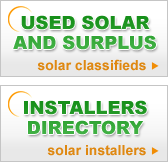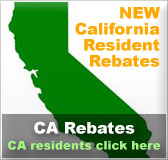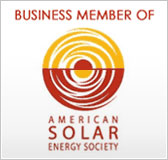Clean power partner solar buyback program – Madison Gas
& Electric:
-Through this program, customer generators receive a special rate
for the electricity produced from their photovoltaic systems.
-Systems must be between 1 kilowatt and 10 kilowatts and have a bi-directional
meter to be eligible. All power produced by the system will be purchased
at a rate of $0.25 per kilowatt hour.
-Customers must sign a ten year interconnection agreement with Madison
Gas & Electric to participate in this program.
Distributed solar tariff – River Falls municipal utilities:
-Customers of River Falls Municipal Utilities who generate electricity
using photovoltaic systems receive a special rate of $0.30/kilowatt-hour
on all electricity produced from 1-4 kilowatts on a first-come, first-served
basis.
-customer continues to pay their normal retail rate for electricity
that they purchase from the utility. All of the energy generated by
the customer's PV system is metered separately and exported directly
to the grid.
-The $0.30/kWh incentive is applied to all of the energy the system
produces for a period of 10 years, under a written contract with the
RFMU. The customer receives payment as a monthly credit on their electricity
bill.
Advanced renewables tariff – Wisconsin Power and Light:
-This tariff offers customers of Wisconsin Power and Light a production
incentive for electricity production from renewable energy sources.
-Qualifying renewable energy sources include solar, wind, biomass/biogas,
geothermal, small hydroelectric, wave, tidal, and fuel cells that
use renewable fuels.
-Systems placed in service on or after January 1, 2007 are the only
ones eligible for this incentive.
--Residential customers must have a minimum participation of 25% of
their electricity consumption to enroll.
-The incentive amount for a solar system between 1 kilowatt and 20
kilowatts is $0.25 per kilowatt hour. The program cap is 683 kilowatts.
-The incentive amount for biomass/biogas is $0.12 per kilowatt hour
on-peak and $0.0735 per kilowatt hour off-peak. This is for systems
that are between 20 kilowatts and 2 megawatts.
-The incentive for a wind energy system that is between 20 kilowatts
and 1 megawatt is $0.12 per kilowatt hour on-peak and $0.0735 per
kilowatt hour off-peak. This program has a non-solar program cap of
0.5% prior year retail electricity sales.
-The on-peak period is weekdays from 8 AM to 10 PM and the off-peak
period consists of all other time periods including many holidays.
-Participants will receive a monthly credit on their bill and will
receive a check from the utility whenever their net monthly bill credit
exceeds $100.
Renewable energy buy-back rates – Xcel Energy:
-Xcel Energy will purchase electricity and renewable energy credits
from residential customers who generate energy by using qualifying
renewable energy systems.
-A ten year, fixed rate contract between the customer and utility
will be established in order for Xcel Energy to purchase the electricity.
-Eligible systems include wind, solar photovoltaic, solar thermal
electric, biomass, biogas, fuel cells using renewable fuels, geothermal
electric, tidal, wave, and small hydroelectric systems.
-This program is available to large systems that are not eligible
for net metering, however there is a minimum system size of 20 kilowatts.
The maximum size is 800 kW for biomass/biogas systems and 1 megawatt
for all other technologies.
-All systems must be connected to the grid at a voltage of 50 kV or
less and
meet all state interconnection requirements.
Solar and wind energy equipment exemption:
-Any value added by a solar or wind energy system is 100% exempt from
general property taxes
-This exemption does not include equipment or components that would
be part of a conventional energy system.
Focus on energy – Renewable energy grant programs:
-These are rebate programs offered by Wisconsin “Focus on Energy”
are designed to encourage the development and use of renewable energy.
-The amount of the grant is varied by technology and energy production.
-Applicants must be located in the service territory of a participating
utility to be eligible to receive a grant.
We energies – Solar thermal incentive program:
-This program is for customers within the service territory of We
Energies who wish to install hot water systems.
-The rebate amount offered through this program is equal to 7.5% of
the installed system cost with a maximum incentive of $750 for residents.
-Systems must meet all requirements to be eligible.
Net metering:
-All renewable energy systems and combined heat and power systems
are eligible for net metering in the state of Wisconsin.
-Systems can be up to 20 kilowatts in capacity but not exceeding.
-Customers receive a credit of the net energy generation produced
by their system on their monthly bill.
-If the credit exceeds $25, then the utility must issue a check for
the amount payable to the customer.
-Net metering does not apply to electric cooperatives.
Residential renewable energy tax credit:
-This personal tax credit allows the taxpayer to claim a credit of
30% of expenditures including labor costs and installation of qualified
residential solar-electric systems, solar water heating systems or
fuel cells. Small wind-energy systems and geothermal heat pumps can
also be accredited for.
-Solar-electric systems and solar water heaters have a maximum incentive
of $2,000 if placed in service before 2009. There is no maximum incentive
for systems placed after 2008.
-The excess amount of the federal tax credit may be carried forward
to the next taxable year if it exceeds tax liability.
-This can be carried forward until 2016, but after that, it is unknown
if the unused credit will be able to be forwarded.
Residential energy conservation subsidy exclusion:
-This is a personal exemption of 100% of energy conservation subsidies
provided by public utilities.
-The value of a purchase or installation of any energy conservation
measure by a customer such as solar water heat, solar space heat or
photovoltaics will not be included in the customer’s gross income.
-Customers of an electric utility company, who participate in the
utility’s energy conservation program, may receive a rate reduction
of electricity furnished or a nonrefundable credit against the purchase
price of the electricity on each monthly electric bill.
Energy-efficient mortgages:
-This is a federal loan program where homeowners can use EEM (energy-efficient
mortgages) to finance renewable energy technologies in a home.








